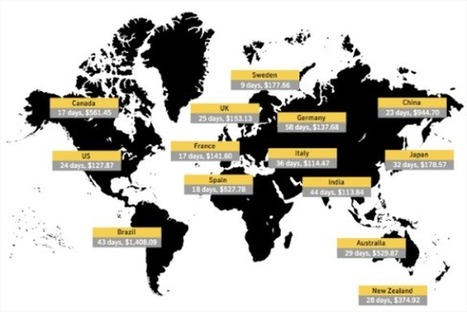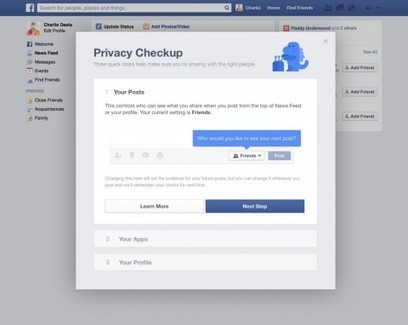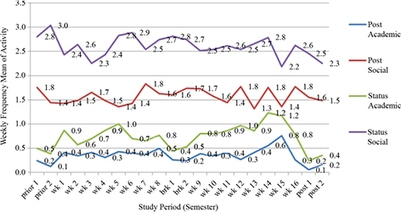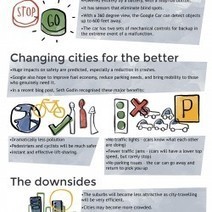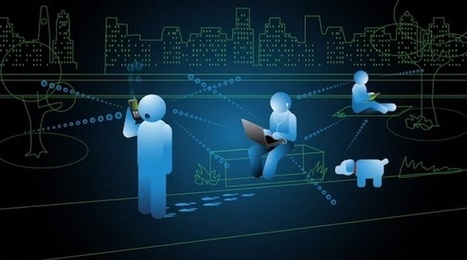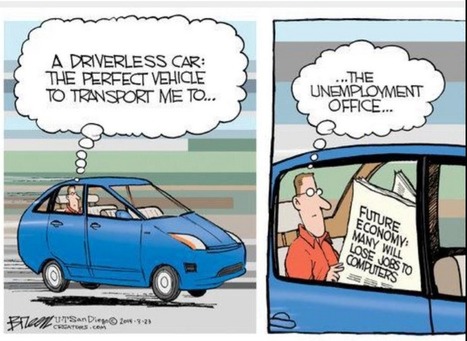The state's secure government networks face an alarming number of cyber attacks. They happen daily, are continuing to grow in number, and have spiked in recent years.
Follow, research and publish the best content
Get Started for FREE
Sign up with Facebook Sign up with X
I don't have a Facebook or a X account
Already have an account: Login
Class Resources for Penn State Berks CAS 383 Course.
Curated by
John Shank
 Your new post is loading... Your new post is loading...
 Your new post is loading... Your new post is loading...
Emily Kooistra's comment,
October 14, 2014 1:13 PM
The article I read discussed cybersecurity in the classroom. There was a large scale survey completed by k-12 teachers, administrators, and technology cooridnators. The research showed that most teachers and adminstrators feel it is important that cybersecurity be taught, most are completely untrained. However there is a discrepancy between the views of all three groups. A majority of Teachers feel that this is best taught by parents, while technology coordinators feel that this should most likely be taught in the classroom. I think this is because technology coordinators feel as though a professional with training and experience should pass down that information.
Mary Beth, Marklein, and TODAY USA. "Study: Teachers lack online training." USA Today n.d.: Academic Search Complete. Web. 14 Oct. 2014.
Kate-Ashlyn Akou-Adjei's comment,
October 14, 2014 1:19 PM
"investigating online harassment and offline violence among young people in Thailand: methodological approaches, lessons learned." This article talks about how crimes are committed through the internet in thailand. Age group targeted is between the ages of 15-24 years. These are highschoolers and college kids that are being attacked through,cyber bullying, identity theft and also having their accounts hacked. This was achieved through constant use of the internet and also through classmates and strangers. These is is done through collecting data and personal issues from minors online. http://web.b.ebscohost.com/ehost/detail/detail?vid=3&sid=41b9bf5a-8ef7-4dfb-9c96-54cb0cf6bc1d%40sessionmgr113&hid=106&bdata=JnNpdGU9ZWhvc3QtbGl2ZSZzY29wZT1zaXRl#db=a9h&AN=98201931
Kate-Ashlyn Akou-Adjei's comment,
October 14, 2014 1:19 PM
"investigating online harassment and offline violence among young people in Thailand: methodological approaches, lessons learned." This article talks about how crimes are committed through the internet in thailand. Age group targeted is between the ages of 15-24 years. These are highschoolers and college kids that are being attacked through,cyber bullying, identity theft and also having their accounts hacked. This was achieved through constant use of the internet and also through classmates and strangers. These is is done through collecting data and personal issues from minors online. http://web.b.ebscohost.com/ehost/detail/detail?vid=3&sid=41b9bf5a-8ef7-4dfb-9c96-54cb0cf6bc1d%40sessionmgr113&hid=106&bdata=JnNpdGU9ZWhvc3QtbGl2ZSZzY29wZT1zaXRl#db=a9h&AN=98201931
Kate-Ashlyn Akou-Adjei's comment,
October 7, 2014 12:10 PM
"First Comes Love, Then Comes Google: An Investigation of Uncertainty Reduction Strategies and Self-Disclosure in Online Dating." This was an article i read about privacy on online dating websites. It was brought to my knowledge that, adequate background checks are not run on these individuals that sign up on these dating websites. Just having a password to your profile or putting up those supposed privacy settings does not really protect you. There amount of data these websites request is unimaginable, your address, phone number, location ... name it! not to forget the ones that have you paying monthly actually take credit cards information. How sure are we that these systems are not broken into daily by hackers and identity thieves. I mean this might sound outrageous and ridiculous, but maybe in the future before sign up on a website or social network, a tour of their database and systems will definitely be required just to know what exactly we are getting ourselves into. Jennifer, Gibbs, Ellinson Nicole, and Lai Chih-hui. Michigan: communication research, Feb2011, V. Print.
Dallan Yoh's comment,
October 7, 2014 1:34 PM
The article I chose discusses the costs of posting information about yourself online. The main examples it gives are about how the data on your profile from one website, such as Twitter or Facebook (which are free sites), can be released to other websites at no cost. So the information you think is exclusive to your profile is actually being given to countless other websites. So the question becomes: who is seeing your information? That question has no answer though and it makes you wonder how much privacy you still hold on the internet, if you even have any. METZ, RACHEL. "Site Asks Social Networkers To Rethink Revelations." Community College Week (2010): 21. Academic Search Complete. Web. 1 Oct. 2014.
Elisa Guatieri's comment,
October 8, 2014 10:56 PM
The article that I read, "Think Twice Before Posting Online," talks about how most people on social networks are not aware of the importance of the user agreements and terms of services while they post on social networks. People are uploading text, photos, and videos without understanding that anything they post is then becomes part of public domain forever. Anything you say on twitter, for example, can be viewed all around the world the second you "tweet" it. There are users that are concerned with copyright laws but they need to think twice about what they are posting on social network sites.Centanni, Jillian A. Think Twice Before Posting Online. Newark, Jew Jersey: n.p., n.d. Print.

Higher Ed InfoSec Council's curator insight,
May 22, 2013 1:01 PM
Visit http://datadealer.com/ to try the game! 
Higher Ed InfoSec Council's curator insight,
May 22, 2013 1:02 PM
Visit http://datadealer.com/ to play the game!
Nyalima Esther Gaojia's comment,
September 30, 2014 12:58 PM
Litt, Eden, and Eszter Hargittai. Smile, snap, and share? A nuanced approach to privacy and online photo-sharing. . N.p.: n.p., 2013. Print.
Kate-Ashlyn Akou-Adjei's comment,
September 30, 2014 1:03 PM
Citation : Congress Daily. Parents worry about TMI online. N.p.: Congress Daily, 10/8/2010. 1. Web. 30 Sept. 2014. <http://web.b.ebscohost.com/ehost/detail/detail?vid=3&sid=238273dc-c958-4522-b66e-a8e78df034b0%40sessionmgr110&hid=118&bdata=JnNpdGU9ZWhvc3QtbGl2ZSZzY29wZT1zaXRl#db=a9h&AN=54489368>;
Erik Lewis's comment,
September 30, 2014 1:13 PM
Looking for issues of privacy on academic search complete brought up an interesting and recent article about how the European Union recently passed a law that states that individuals have the right to have harmful data about themselves removed from internet searches. This article is specifically about how Google is dealing with the law while struggling to maintain relevance. I can understand the argument, because while people do have a right to have harmful data removed, without limiting the definition of harmful data, there's nothing to stop the removal of all data by all parties, severely limiting the usefulness of search engines like Google. The article covers Google's current policy for removal of search results, as well a recent court case where a Spanish man requested that a 15 year old announcement be removed from Google because it was damaging to his reputation. The man won his initial court case, but upon appeal, Google was found to be justified in including the record. This applies to our class discussion because we have been talking about how the internet never forgets, a fact that is corroborated by experts like Larry Lessig, who says that data has become more expensive to delete than to keep, but if Google's standards for removal are lessened, this could introduce an element of "forgetfulness" into the internet, which could be helpful to the internet generation.
Weiss, Todd R. "Google Working Out Specifics Of EU's 'Right To Forget' Law." Eweek (2014): 5. Academic Search Complete. Web. 30 Sept. 2014.

Sasha Henry's comment,
September 18, 2014 11:51 AM
Given that social media users have the ability to control their individual privacy to some extent, is it wrong for third parties such as corporations or government to utilize this information for profiling?
Social Networking Privacy: How to be Safe, Secure and Social. Privacy Rights Clearinghouse. Retrieved from https://www.privacyrights.org/social-networking-privacy-how-be-safe-secure-and-social
's comment September 18, 2014 1:47 PM
In the article I read, it explains that on Facebook, people are typically only more likely to adjust their privacy settings if they've had issues, otherwise, most people do not even bother to look into the privacy settings. Even for those that may have restrictions on their profile pages, they may not take into account the number of friends they have, which can be just as "dangerous" or detrimental to one's privacy. Overall, people underestimate social media sites like Facebook, and all of the effects they may have on our individual privacy. Debatin, Bernhard, Jennette P. Lovejoy, Ann-Kathrin Horn, and Brittany N. Hughes. "Facebook and Online Privacy: Attitudes, Behaviors, and Unintended Consequences." Journal of Computer-Mediated Communication 15.1 (2009): 83-108. Web. 18 Sept. 2014.
Kayla Hayick's comment,
September 22, 2014 4:25 PM
I dont think people really know how much privacy they dont have online. I do believe that yik yak is a dangerous website and the privacy they offer is only hurting people, not helping them. The article explains why there is fault in privacy on the internet. I also don't think people necessarily care about privacy on the internet unless something personal happens to them. http://web.a.ebscohost.com.ezaccess.libraries.psu.edu/ehost/detail/detail?vid=13&sid=c8587302-0308-42f0-937f-2de29dcdad49%40sessionmgr4003&hid=4107&bdata=JnNpdGU9ZWhvc3QtbGl2ZSZzY29wZT1zaXRl#db=a9h&AN=91719882

Idris Grant's curator insight,
August 25, 2014 3:31 PM
With all the talk of "The Internet of Things," and the rapid advances we're seeing with all-things web, smart devices and hyper-connected world, we found this Infographic goes a long way to tell the story. |
's comment October 7, 2014 5:47 PM
In the article I read, the authors weigh the costs and the benefits of the Internet for children. While the Internet can be a great tool for education and learning purposes, it can also have huge negative effects on their emotional and mental safety. Today, using computers and the Internet are practically fundamental in children's classrooms; even children as young as six or seven. Furthermore, by youth getting acquainted with the Internet at such an early age, they are more inclined to put their personal information out there, and in turn, this can lead to unwanted or inappropriate interactions online. It is extremely important that we begin to educated children on the potentially harmful aspects of using the Internet. Mitchell, Kimberly J., Janis Wolak, and David Finkelhor. "Are blogs putting youth at risk for online sexual solicitation or harassment?" Child Abuse & Neglect 32 (2008): 277-94. Web. 7 Oct. 2014.
's comment September 30, 2014 6:58 PM
In the article, "Facebook Privacy Settings: Who Cares?" (2010), the authors, Danah Boyd and Eszter Hargittai in a sense play "devil's advocate" to everything that we have discussed in class. We place so much emphasis on privacy online, but in all reality, who cares? The lack of privacy, for the vast majority of us, does not prevent us from using social media or online shopping. The authors found that despite all of the complaints and criticism against Facebook, their ability to attract users is still increasing. As a student of this course, it is definitely useful to become more aware of some of the ramifications of the lack of privacy online, but I know that for most of us, it won't stop us from using the Internet. Regardless of whether you care about the privacy settings on your social media sites, I still think it's important to know the costs and the benefits of the Internet. Boyd, Danah, and Eszter Hargittai. "Facebook Privacy Settings: Who Cares?" First Monday 15.8 (2010). Web. 30 Sept. 2014.
Emily Kooistra's comment,
September 23, 2014 1:22 PM
The article that I read spoke about how technology impacts our younger generations' education and compares it from this century and earlier ones. What struck me was that although the author makes very valid points, they are still not aware of exactly how this will impact our youngsters' education and how effective technology is in the classroom . Mostly because of how rapidly technology is evolving.
McPheeters, Dallas. "Cyborg Learning Theory: Technology In Education And The Blurring Of Boundaries." World Future Review (World Future Society) 1.6 (2009): 34-39. Academic Search Complete. Web. 23 Sept. 2014.
Kate-Ashlyn Akou-Adjei's comment,
September 23, 2014 1:22 PM
Aslong as you own a social network, or some system of that source you have some little piece of information regarding yourself out there. The question is are we ready or do we even know whats out there about us. You might be thinking, "oh I dont own social network page, so I'm good". Well sorry to burst your bubble, blogging could be considered one, or even some jobs have a profile of their employees out online. In my view there is probably nothing like privacy anymore, a lot of our personal information and life is out there on the internet for the world to see. Be it through facebooks, supposed privacy settings or even through their new facebook messenger app, which actually takes hold of a lot of information on your phone without your knowledge. http://web.a.ebscohost.com/ehost/detail/detail?vid=3&sid=ab5ccc77-9e74-4951-b6f4-33fc2abe4ad3%40sessionmgr4003&hid=4114&bdata=JnNpdGU9ZWhvc3QtbGl2ZSZzY29wZT1zaXRl#db=a9h&AN=96920246
Kate-Ashlyn Akou-Adjei's comment,
September 23, 2014 1:25 PM
work cited. Jacquelyn, Burkell. Facebook. Vol. 17. N.p.: Taylor and francis, 2014. Print.
's comment September 17, 2014 3:03 PM
In the article I read, Wi-Fi is the New Cigarette written by Rishona Campbell it states that over 61% of Americans have access to Wi-Fi in their homes. We this statement you can assume that the families using this Wi-Fi are for a newer advancement of technology such as cellphones, Ps4, Xbox, Smart TVs, laptops, tablets, etc. So, with over 61% of Americans having this access in their house unleashes a question: Who exactly has access through this Wi-Fi? Because of the advances in technology over the last couple decades we have found out not only have we became lazy because of such technologies, but we have also become ignorant. Any hacker can fully mirror an individual’s computer with access to their IP Address which is produced over the Wi-Fi. This is showing we have become ignorant of our privacy. We have abused this privilege that was given to us and now we cannot take it back.
Campbell, Rishona. Wi-Fi is the New Cigarette. Vol. 0 . N.p.: DashBurst, 2014. N. pag. Web. 25 Mar. 2014. <http://blog.dashburst.com/infographic/wi-fi-new-cigarette/>.
Payden Rybicki's comment,
September 18, 2014 10:50 AM
The article I read was about how schools are expanding their technology to the students. Although in California they just passed a law that restricts some of the technology used from kindergarten through high school. People are saying it is a landmark law that could change how people look at technology in schools. In the law they prohibited educational sites, apps and cloud services because they disclose personal information for the students which they don't want at all. This law will become very important to society in the future because technology only grows it never tracts backwards.
http://sk8es4mc2l.search.serialssolutions.com/?genre=article&issn=03624331&title=New%20York%20Times&volume=163&issue=56625&date=20140915&atitle=With%20Tech%20Taking%20Over%20In%20Schools%2C%20Worries%20Rise.&spage=B1&pages=&sid=EBSCO:Academic%20Search%20Complete&aulast=SINGER,%20NATASHA Singer, Natasha. "With Tech Taking Over in Schools, Worries Rise." The New York Times 15 Sept. 2014: 1. Print
Payden Rybicki's comment,
September 18, 2014 10:50 AM
The article I read was about how schools are expanding their technology to the students. Although in California they just passed a law that restricts some of the technology used from kindergarten through high school. People are saying it is a landmark law that could change how people look at technology in schools. In the law they prohibited educational sites, apps and cloud services because they disclose personal information for the students which they don't want at all. This law will become very important to society in the future because technology only grows it never tracts backwards.
http://sk8es4mc2l.search.serialssolutions.com/?genre=article&issn=03624331&title=New%20York%20Times&volume=163&issue=56625&date=20140915&atitle=With%20Tech%20Taking%20Over%20In%20Schools%2C%20Worries%20Rise.&spage=B1&pages=&sid=EBSCO:Academic%20Search%20Complete&aulast=SINGER,%20NATASHA Singer, Natasha. "With Tech Taking Over in Schools, Worries Rise." The New York Times 15 Sept. 2014: 1. Print
Emily Kooistra's comment,
September 9, 2014 11:12 AM
The article I read spoke about how a pharmaceutical school in Buffalo is handling the constant multitasking of their students. The school's professors have noticed a drastic decrease in the amount of reading that students will do and how that can negatively impact their critical thinking skills. Most classrooms do not allow students to bring laptops in order to make sure they give the professor their undivided attention. They were also looking at ways to block cell signal in classrooms so students could use their phones either. In a way I think this is naive. Technology and multitasking are things that are not going to disappear and are going to be a very big part of their students' futures. Instead of completely blocking out these new devices, I think the school should be looking for innovative ways to incorporate those types of devices in their classroom and get students to exercise focus. Brazeau, Gayle A., and Daniel A. Brazeau. "The Challenge Of Educating In A Highly-Connected And Multitasking World." American Journal Of Pharmaceutical Education 75.7 (2011): 1-2. Academic Search Complete. Web. 9 Sept. 2014.
http://web.b.ebscohost.com.ezaccess.libraries.psu.edu/ehost/pdfviewer/pdfviewer?sid=d4692f05-3192-4fe6-a065-e00e74bc9672%40sessionmgr113&vid=10&hid=120
Elisa Guatieri's comment,
September 9, 2014 1:35 PM
The article I read was about a study that was published by a psychologist at the University of Utah, who found that it is more distracting for drivers to be talking on their cell phone than having a conversation with passengers. During the research, 41 drivers were paired with friends. In the first experiment the driver used a hands free cell phone to talk to the passenger who was not in the car. In the second experiment they both driver and passenger were in the car. In the third experiment, they were both in the car but did not have a conversation. The conclusion was that drivers having a conversation on a cell phone was 4 times more likely to miss pulling off at a rest area(as previously instructed in the experiment) as those talking to passengers in person. They were also more likely to drift in lanes and keep more distance between their car and the one in front of them.
Elisa Guatieri's comment,
September 9, 2014 1:35 PM
"Cell phone use more distracting to drivers than with chatting with passengers." Harvard Mental Health Letter Feb. 2009: 7+. Web. 9 Sept. 2014.
Elisa Guatieri's comment,
September 4, 2014 6:11 PM
Rosen, Larry D., Mark L. Carrier, and Nancy A. Cheever. N.p., May 2013. EBSCOhost. Web. 4 Sept. 2014.

Sasha Henry's comment,
September 9, 2014 7:59 AM
The article read was “Is Google Making us Stupid,” by Nicholas Carr. He postulates that the advent of the internet, and the continued use of search engines capable of finding information we need in a matter of seconds, has changed the way humans process information. According to Carr, we are no longer able to patiently look for information, and instead expect information to be presented the way the internet does it, failure to which we grow impatient with the source. Our brains have become rewired to skim through information, rather than engage in deep reading. This is in line with Dudley’s assertion that the internet and the coming of third generation technologies, has changed how humans process information, and made the human mind much slower and lacking in essential analytical skills.
Carr, Nicholas. “Is Google Making Us Stupid.” The Atlantic, 1 July 2008. <http://www.theatlantic.com/magazine/archive/2008/07/is-google-making-us-stupid/306868/>;
Emily Rumpf's comment,
September 9, 2014 9:36 AM
This article emphasizes the connection between a adolescent's shyness and their problematic internet use. As one of the disadvantages of the internet, mentioned in class, adolescents can be victims of cyberbullying or solicitations. This study shows that if a child tends to be more shy there is a direct correlation and increase in their problematic internet use, than one who is more social with their peers. This directly relates to some of the issues addressed in the Frontline video. Huan, Vivien S., et al. "The Impact Of Shyness On Problematic Internet Use: The Role Of Loneliness." Journal Of Psychology 148.6 (2014): 699-715. Academic Search Complete. Web. 9 Sept. 2014.
|






